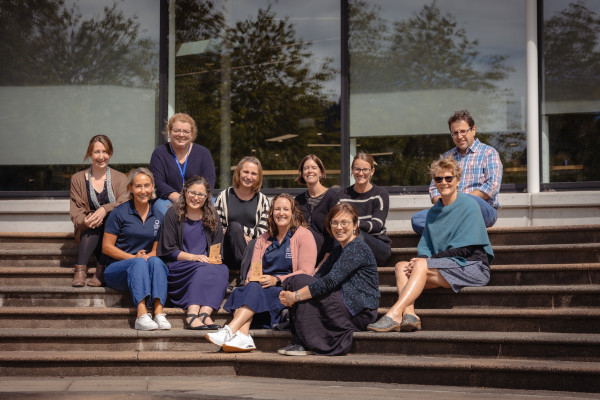- Tūhono home Hoki ki Tūhono
-
- Staff Directory
- Chief Executive Office Auckland International Office Corporate Services Finance Campus Services Functions and Catering Information Systems and Support Marketing, Communications and Engagement Learner Journey Academic Registry International Learner Services Te Punaka Ōwheo
- Learner Experience Academic Excellence Central Campus College of Community Development and Personal Wellbeing College of Engineering, Construction and Living Sciences College of Health College of Work Based Learning Open Education Resource/OERu Research and Postgraduate Studies Te Maru Pumanawa | College of Creative Practice and Enterprise
- Māori Development and Kaitohutohu Office People, Culture & Safety People and Culture Childcare Centre Te Ama Ako | Learning and Teaching Development Wellbeing and Safety Auckland Staff Directory Executive Office Academic Corporate Services Marketing and Business Development Human Resources Campus Quality and Programme Development
-
 Our people make a better world
Our people make a better world
We build the capabilities of individuals, organisations and communities and help them to realise their potential.
Staff Directory
-
- Tools
- Academic Integrity Declaration Form AIC Applications Dashboard Approved Programmes Approved Programme Fees Centralised Assessement Repository Chemwatch CMS - Tūhono & StudentHub updates Course Evaluation and Surveys CRM Applications CRM customer service hub Delegations policy/process Disability and Neurodiversity Dynamics 365 (CRM) EBS Ontrack EBS Report Email Security Personal Portal Employment Matters / Solarworkplace / Performance Reviews eTaxi eTV
- Financial Variance Reporting Hidden Disabilities Sunflower programme FCM travel intranet InPlace International entry requirements Knowledgebase articles Learner Capability Learner Support Dashboards Linkedin Learning Log a job with Marketing Login as an applicant Microsoft 365 Moderation App Moodle OP Docs OP Docs - Publishing OP Image Libraries Performance Excellence Portal Product Evaluation Panel
- Policy Library Privacy Programme and Course Design and Development Qualtrics XM RDS Remote Access Support Portal Research Database Robertson Library Staff FAQs about Graduation Status of Programmes Student Hub (Kāpehu demonstration view) Study Abroad info for learners Tūhauora I Wellbeing resources Uniprint Vault Webexpenses Auckland Tools
-
 Vault
Had an accident or near miss?
Log it here
Vault
Had an accident or near miss?
Log it here
-
- Communities
- Community AI Steering Committee Ally Network EBS Community of Interest EdTech Champions Health & Wellbeing Research Internal Evaluation Neurodiversity Professional Team Professoriate Proud@OP Student Support Website Advisory Group Web Champions Working under the Rainbow Project Learner Capability Trade Training Centre
- Committee Academic Committee Animals@OP Diversity and Equity Doctor of Professional Practice Committee Kaunihera Whakahaere - Leadership Council Internal Evaluation Learning & Teaching Leadership Team Library Committee Mental Health and Wellbeing Advisory Group Otago Polytechnic Board of Directors Pastoral Care Code Committee Programme Approvals Committee Research and Postgraduate Committee Research Ethics Committee Staff Subcommittee
- Think Tanks Mātauraka Our learners achieve educational success Pūtea Our financial success Tākata Our people, our team, our community Tiriti Our active commitment as a Treaty partner Tūroa Our commitment to be a sustainable and responsive organisation
-
 Create a community
Create a community
Do you have a community, committee or project that you'd like represented here?
Communities
-
- About OP
- Keep up to date All news All events All notices All blogs Share your info Create a news article Create an event Create a notice Create a blog
- Community and Partnerships Alumni and friends Education Foundation Operational information Academic calendar 2025 Academic calendar 2026 Current vacancies Dunedin campus map Our policies Topical FAQs
- Who we are Commemorative sites Māori Strategic Framework Our history Our strategic priorities Pasifika Strategic Framework (2025-2030) Vision and Values Working for us OP job opportunities Wellbeing Calendar Working at OP
-
New Zealand: 0800 762 786
contact us
International: +64 3 477 3014
Gaining from giving: The benefits for midwives of working with student midwives
Author: Emma Bilous
Gaining from Giving: The Benefits for Midwives of Working with Student Midwives
Emma Bilous
2 October 2018
Abstract
Asking any midwife what she remembers of being a student midwife brings tales of nervousness and anxiety, balanced with stories of kindly wise midwives whose words you still hear to this day. Midwives can usually easily conjure their own student memories, but probably very few have paused to think what the experience of having a student was like for the midwife. This paradox, where the relationship between student midwife and midwife is important enough to be forever etched into our memories, but has all the focus on one partner, was the seed for this thesis.
I wanted to bring the experiences of the midwives in these formative relationships from the shadows. I was intrigued, from my own experiences of working with student midwives on practice placements in my years as a Lead Maternity Care (LMC) midwife and in my current role in midwifery education. I wondered whether formally exploring the experiences of midwives working with student midwives would support my own feelings that midwives as well as students benefitted from the relationship. This exploration seemed worthy as I was unable to find any literature that had directly considered this.
From this came my research question “what are the benefits for midwives of working with student midwives?” The study used to explore this question was qualitative in design, using a self-selecting sample of ten LMC midwives who participated in semi-structured interviews. An Appreciative Inquiry (AI) approach was used to consider what the benefits might be as opposed to any negative aspects of the relationship. The data was analysed using thematic analysis and the findings grouped into three main themes of sustaining midwifery, enhancing midwifery practice and affirming midwifery ways of knowing and being.
The study was underpinned by a theoretical feminist standpoint of otherness. As midwifery is a predominantly female profession it is the other to dominant gender norms. This standpoint was also evident in the outcomes from the study, where the discussion and conclusions reflect the context of being the other. This otherness liberated the midwives to behave differently in a relationship that would otherwise conform to traditional roles of teacher and student or expert to novice and allowed reciprocity to flourish.
The benefits that midwives gain from working with student midwives were multi-layered and more complex than I had anticipated. The midwives often describe seemingly small singular choices that had far reaching impacts, such as sustaining the midwifery profession to influence the position of women in society in Aotearoa/New Zealand. The depths of the benefits gained led to the recommendation that midwives be incentivised to work with student midwives, so these benefits may be enjoyed more widely. Further, that student midwives may understand the contribution they make to the profession even before they are registered midwives.
Emma Bilous' thesis was supervised by Christine Griffiths and Jean Patterson.
License
This thesis is available under a Creative Commons Attribution-NonCommercial-NoDerivatives licence CC BY-NC-ND 4.0.
